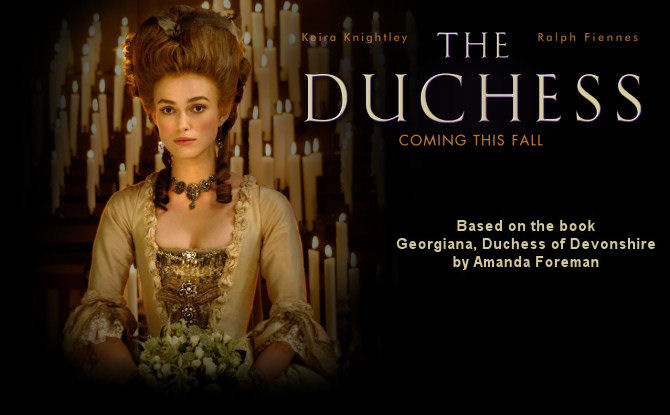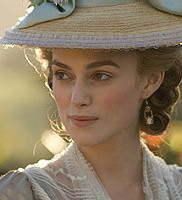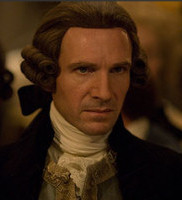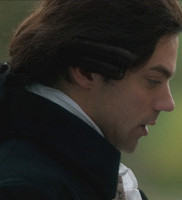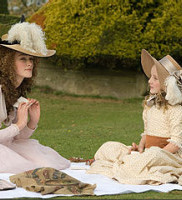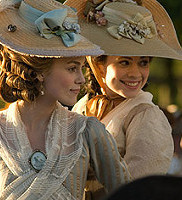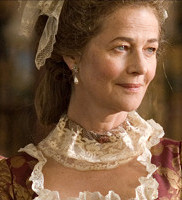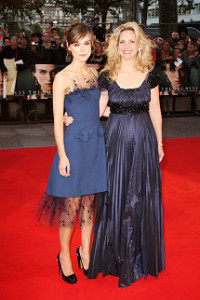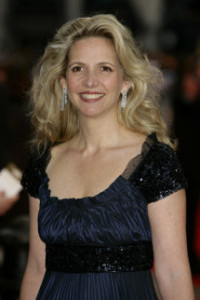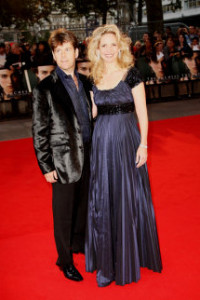‘The Duchess’, starring Keira Knightley, Ralph Fiennes, Charlotte Rampling and Dominic Cooper, based on the life of Duchess Georgiana (1757-1806), wife of the 5th Duke of Devonshire.
Behind the Scenes with Amanda Foreman
Amanda Foreman discusses her role as a consultant for The Duchess:
Filming ‘The Duchess’ at Kedleston Hall
My contract stipulated that I had to be on the set for ten days, to provide background information or advice as needed. As I drove up to the drive to the house, past the peacefully grazing sheep, a scene of mad activity suddenly came into view. The car park was full to bursting. Great hulking lorries obscured Kedleston’s famous portico. Massive lights and cables colonized the forecourt. No one was standing still except for the extras who clustered together in awkward little groups, gingerly wearing in their freshly pressed costumes. I climbed out of the car feeling very small and unimportant.
How do you solve a problem like Georgiana?
We had shared a set of assumptions — a framework of beliefs — that are the essence of youth. I maintained those beliefs while writing the book, even as Georgiana’s changed. Yet at the time, I was too young and inexperienced to notice. From start to finish, in my mind’s eye Georgiana was always the 27-year-old heroine fighting to be the agent of her own destiny. As I look at her now, I see someone quite different.
Excerpts from the Book Georgiana, Duchess of Devonshire:
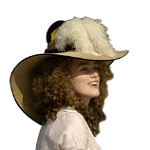
Georgiana, played by Keira Knightley
Extract from the book Georgiana, Duchess of Devonshire by Amanda Foreman
Georgiana, played by Keira Knightley‘I know was handsome …. and have always been fashionable, but I do assure you,’ Georgiana, Duchess of Devonshire, wrote to her daughter at the end of her life, ‘our negligence and ommissions have been forgiven and we have been loved, more from our being free from airs than from any other circumstance. Lacking airs was only part of her charm. She had always fascinated people. According to the retired French diplomat Louis Dutens, who wrote a memoir of English society in the 1780s and 1790s, ‘When she appeared, every eye was turned towards her; when absent, she was the subject of universal conversation.’ Georgiana was not classically pretty, but she was tall, arresting, sexually attractive and extremely stylish. Indeed, the newspapers dubbed her the ‘Empress of Fashion’.
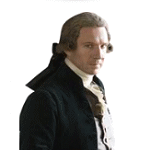
The Duke, played by Ralph Fiennes
Extract from the book Georgiana, Duchess of Devonshire by Amanda Foreman
The Duke had had a lonely upbringing which was reflected in his almost pathological reserve. One of his daughters later joked that their only means of communication was through her dog: ‘the whole of tea and again at supper, we talked of no one subject but the puppies …. I quite rejoice at having one in my possession, for it is never a failing method of calling his attention and attracting his notice. However, behind the Duke’s wooden facade was an intelligent and well-educated mind. According to Wraxall, his friends regarded him as an expert on Shakespeare and the classics: ‘On all disputes that occasionally arose amongst the members of the club (Brooks’s) relative to passages of the roman poets or historians, I know that appeal was commonly made to the Duke, and his decision or opinion was regarded as final.’
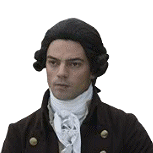
Charles Grey, played by Dominic Cooper
Extract from the book Georgiana, Duchess of Devonshire by Amanda Foreman
He was only twenty-three years old, the eldest son of a general from a well connected Northumberland family. Georgiana had met him before, when he was a schoolboy at Eton, and had visited his parents at Coxheath. In the intervening period he had grown into a tall, handsome young man with an aristocratic appearance, possessing a high forehead, thick hair, melancholy dark eyes and a long nose. ‘He has the patrician thoroughbred look …. which I dote upon,’ remarked Lord Byron, when he first saw him.
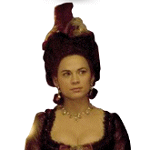
Lady Elizabeth Foster, played by Hayley Atwell
Extract from the book Georgiana, Duchess of Devonshire by Amanda Foreman
Never was a story more proper for a novel than poor Lady Elizabeth Foster’s (wrote Mrs. Dillon). She is parted from her husband, but would you conceive any father with the income he has should talk of her living alone on such a scanty pittance as £300 a year! And this is the man who is ever talking of his love of hospitality and his desire to have his children about him! Might one not imagine that he would be oppos’d to a pretty young woman of her age living alone? It is incredible the cruelties that monster Foster made her undergo with him; her father knows it, owned him a villain, and yet, for fear she should fall on his hands again, tried to persuade her to return to him.
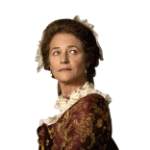
Lady Spencer, played by Charlotte Rampling
Extract from the book Georgiana, Duchess of Devonshire by Amanda Foreman
Georgiana’s mother had delicate cheekbones, auburn hair and deep brown eyes which looked almost black against her pale complexion. The fashion for arranging the hair away from the face suited her perfectly. It helped to disguise the fact that her eyes bulged slightly, a feature which she passed on to Georgiana. She was intelligent, exceptionally well read and, unusually for women of her day, she could read and write Greek as well as French and Italian. A portrait painted by Pompeo Batoni in 1764 shows her surrounded by her interests; in one hand she holds a sheaf of music – she was a keen amateur composer – near the other lies a guitar; there are books on the table and in the background the ruins of ancient Rome, referring to her love of all this classical. ‘She has so decided a character,’ remarked Lord Bristol, ‘that nothing can warp it’.
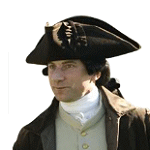
Charles James Fox, played by Simon McBurne
Extract from the book Georgiana, Duchess of Devonshire by Amanda Foreman
Charles James Fox, her second new acquaintance, made a great impression on Georgiana, not in a romanticway – that would emerge later – but intellectually. It was Fox, more than anyone else, who led Georgiana to her life’s vocation – politics. Fox was a brilliant though flawed politician. Short and corpulent, with shaggy eyebrows and a permanent five o’clock shadow, he was already at twenty-eight marked down as a future leader of the Whig party when the Marquess of Rockingham retired. Georgiana become friends with him when he came to stay at Chatsworth in 1777. Is career until then had veered between political success and failure, between unimaginable wealth and bankruptcy. He confounded his critics with his irrepressible confidence, and exasperated his friends by his incontinent lifestyle. Eighteenth-century England was full of wits, connoisseurs, orators, historians, drinkers, gamblers, rakes and pranksters, but only Fox embodied all these things.
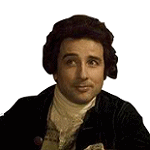
Richard Brinsley Sheridan, played by Aiden McArdle
Extract from the book Georgiana, Duchess of Devonshire by Amanda Foreman
At its broadest the Circle numbered more than a hundred people; at its most intimate, thirty. In modern terms they were London’s ‘cafe society’: the racier members of the aristocracy mixed with professional artists and actors, scroungers, libertines and wits. The playwright and arch-scrounger Richard Brinsley Sheridan was one of its stars. An incorrigible drinker, womanizer and plotter, he embodied the best and worst of the Circle. He was brilliant yet lazy, kind-hearted and yet remiss over honouring his debts to the point of dishonest.
The Daily Mail Online – 21 September 2008
How Fergie and the Duchess in the hit movie are directly related through an illegitimate child
By Laura Collins
In a heart-rending scene in the hit movie, Georgiana, Duchess of Devonshire, gives away her love child by a future Prime Minister . . . and incredibly, today we can reveal how that abandoned child is directly related to the Duchess of York and her two daughters.
The Times – 20 September 2008
How to get dressed: tailoring
By Lisa Armstrong
Discussing her new film, The Duchess, Keira Knightley revealed that the rigid 18th-century corsets made her and co-star Hayley Atwell belch constantly, and constricted their frames to the point where they couldn’t breathe. Charming.
BBC Radio 4 – 5 September 2008
The Film Programme
Ralph Fiennes, the star of Schindler’s List and The English Patient explains why his character, The Duke of Devonshire, is misunderstood and why he’s definitely not based upon Prince Charles.
The Telegraph – 16 August 2008
On-set report: The Duchess
By David Gritten
Amanda Foreman’s bestselling account of the colourful life of Georgiana, Duchess of Devonshire, is coming to cinema screens, with Keira Knightley as the tormented celebrity aristocrat trapped in a loveless marriage. David Gritten talks to cast and crew about the film’s key moments
Tatler – August 2008
High Society
By Lucy Moore
Loosely based on the bestselling biography by Amanda Foreman, The Duchess tells the story of Georgiana’s unhappy marriage, her husband’s affair with her best friend, Lady Bess Foster and her own passion for the future prime minister, Charles Grey. But woven through the ill-fated love story runs another narrative altogether, that of Georgiana’s development from naive ingénue into so-called Empress of Fashion and a leading light in late eighteenth-century high society.
